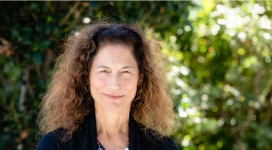AGUA ZARCA, El Salvador -- For women in rural El Salvador, nearly every minute of the day is filled with homemaking tasks: cooking and grinding corn, patting out tortillas, washing, hauling water and firewood and caring for children. But this fall a group of 17 women from 11 communities in northern Morazan state took a two-day break from their routine to visit and share ideas and stories with women's groups in other parts of the country.
Participants returned from the trip, which Mennonite Central Committee (MCC) helped organize, with new friends and a different perspective on their own lives.
Along with two religious sisters, I accompanied the women -- all leaders of Christian women's groups -- as they visited groups in San Salvador, the capital, and the nearby sprawling cities of San Martmn and Soyapango. Many of the women got up early to prepare. Blanca Nieves Vijil, for example, awoke at 1 a.m. Sept. 9. She made two days' worth of tortillas for her family and then walked two hours from her remote community of Ojos de Agua to meet the bus.
The women visited La Lmnea, a poor community along abandoned railroad tracks in San Martmn, where they shared experiences with two women's craft-making groups supported by MCC worker Paul Brohaugh. Several of the women from Morazan are also skilled in making hammocks and crochet bags and have experience in group organization. The 30 women gathered in small groups to discuss product ideas, methods and organizational experiences.
In Soyapango, representatives of the community savings and loan groups Mujeres Para un Futuro Mejor (Women for a Better Future) welcomed the visitors with fresh "quesadilla" (a Salvadoran specialty cheese bread) and coffee, eager to share their experience with savings and small business initiatives.
"Knowing that I will earn something for my savings, I am encouraged to put forth the effort to save," explained Miriam Martmnez, a member of the community loan group.
During the visit and later in an evening reflection time, the Morazan women expressed interest in these women's steps to respond to their families' economic needs. Paula Romero, who leads a savings and credit group in Torola, Morazan, shared the experience of her own group -- a local effort many of the women had not previously been aware of.
Later in the trip, leaders of the women's organization Las Dignas described their efforts to address numerous facets of gender issues: sexual and reproductive rights, violence against women, support of women in politics, economic issues affecting women and anti-sexist education.
On each visit, the Morazan women presented a copy of the booklet "Tomamos La Palabra" ("We Speak Out"), a collection of their own life stories created with MCC support, as well as a product of their own skills -- bread wrapped in an embroidered cloth, a knotted string sack, a crochet bag and a coin purse.
A month after the trip, the Morazan women reflected on the experience during their monthly gathering. "We are not the only ones who work," observed Basilia del Carmen Blanco. "The others in the three places where we went also look for what direction to give to life."
She and Rosa Haydee Amaya have been thinking about how to incorporate new ideas into their women's groups. Haydee Amaya described how the women in her group have started to save two colons (23 cents U.S.) monthly to start a group fund.
The experience broadened the women's awareness of conditions in other parts of the country. Zoila Lspez Chicas commented that she had gone to San Salvador before, but had never seen the living conditions in urban communities such as La Lmnea and Soyapango.
"At least we have a place to live," said Claudia Pirez. "We don?t have the latrine right beside the kitchen. They don?t have space to hang their clothes to dry. If there are earthquakes, everything comes down!"
Carmen Elena Hernandez observed, "One values what she has when she sees another reality."
Perhaps most significant of all were the human connections established. "Juntas podemos (Together we can)," reiterated Udelia Vasquez. "One alone cannot do anything."
By Audrey Hess
-

Pastor John Piper Offers Insight and Encouragement for First-Time Bible Readers in 2025
As the new year begins, many Christians have resolved to take on the project of reading the Bible cover to cover. That's great and all, but if it's your first time, just where do you start?
-
[Exclusive Interview] A revelation within the brink of life and death — Meg Leung’s mission in Christian art
Meg Leung (梁麗橋), an artist with a lifelong love for watercolor painting, sees her art as more than a means of expressing her inner world; it is a bridge connecting her to God. Her artistic journey has revealed God’s perfect plan and inspired her to communicate the power of faith through her wor
-
Former President Jimmy Carter Honored with State Funeral, Grandchildren Reflect on Sunday School Legacy
Former U.S. President Jimmy Carter, remembered not only for his leadership but also for his lifelong dedication to teaching Sunday school, was laid to rest on January 9 in a solemn state funeral filled with scripture and heartfelt tributes.
-
Korean cult leader who raped victims ‘in the name of God’ sentenced to 17 years in prison
Jung Myung-seok (정명석), leader of the Korean religious cult Jesus Morning Star (JMS), also known as Christian Gospel Mission (CGM), has been sentenced to 17 years in prison by South Korea’s Supreme Court.
-
5 times fire was used in the Bible as judgment: Reflecting on the LA wildfires
The recent wildfire in Los Angeles has prompted Pastor David Zhai (翟大衞) to reflect deeply on five significant instances of fire in the Bible. Pastor Zhai, a frequent speaker and preacher at churches in the Vancouver area, often interprets current events and news from a biblical and faith-based perspective.




![Saving Gen Z’s Faith: Steve Richardson’s Bold Call to a New Generation of Missionaries [Exclusive Interview]](https://www.gospelherald.com/media/cache/thumbnail/7/21/72196sp_273w_150h_1x_1y.jpg)

